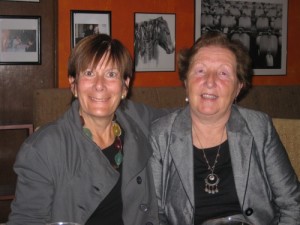A GUEST POST BY STEPHENIE FOSTER
 I just returned from Pristina, Kosovo, where I spent a week talking with (mostly) women leaders about the critical role of women in driving political and substantive policy change. I was there as part of the U.S. Speaker program sponsored by the U.S. Department of State. See http://www.facebook.com/#!/notes/us-embassy-pristina-kosovo/women-leaders-in-kosovo-you-are-creating-new-models-of-womens-power-for-your-cou/156375374382822
My first impressions: lots of traffic, lots of activity, many people walking around, drinking coffee in cafes, lots of young people. Kosovo is a new country and evidence of the war is evident, from the presence of KFOR troops (the NATO led international peacekeeping Kosovo Force) to still damaged and destroyed buildings. Throughout my stay, I was struck by a sense of resolve and desire to build a new community and country.
I just returned from Pristina, Kosovo, where I spent a week talking with (mostly) women leaders about the critical role of women in driving political and substantive policy change. I was there as part of the U.S. Speaker program sponsored by the U.S. Department of State. See http://www.facebook.com/#!/notes/us-embassy-pristina-kosovo/women-leaders-in-kosovo-you-are-creating-new-models-of-womens-power-for-your-cou/156375374382822
My first impressions: lots of traffic, lots of activity, many people walking around, drinking coffee in cafes, lots of young people. Kosovo is a new country and evidence of the war is evident, from the presence of KFOR troops (the NATO led international peacekeeping Kosovo Force) to still damaged and destroyed buildings. Throughout my stay, I was struck by a sense of resolve and desire to build a new community and country.
During the week, I talked to and with members of the parliamentary Women’s Informal Group (essentially a multiparty caucus); members of the government focusing on gender equality and fighting trafficking; NGO leaders and members; journalists; and minority women involved in local politics. I also visited an impressive women’s shelter.
Throughout the meetings, we talked about the importance of women’s political and societal participation; how to create policies that have a positive impact on the lives of women and their families; and the importance of fighting gender based violence and trafficking. (By the way, the Kosovo parliament has a 30% quota for women).
One of the most striking things was that women in Kosovo, with their unique histories and challenges, face many of the same issues as women in the United States and around the world. We all grapple with questions around how to access power in our societies, how to increase the space for women in the community and policy dialogue, how to make a lasting difference and how to balance work and family obligations. As a lawyer, I was particularly impressed by an NGO called NORMA, founded over a decade ago by women lawyers like Valbona Salihu to provide women with free legal aid. They’ve helped thousands of women on their cases and are also working on policy areas, like fighting domestic violence.
I saw a good base of women who are engaged – whether in parliament, government ministries, NGOs or the media – and working hard to expand that space. These women, and the men who support them, are creating new models of power for Kosovo. By their powerful examples, they are creating new options for thinking about policy-makers and power, how to define power and leadership, and the face of leadership.
I look forward to returning to Kosovo – hopefully seeing even more women in parliament and civil society, and more women leaders across the board.
